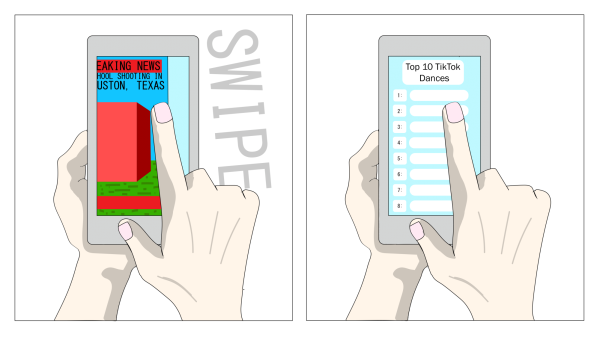High standard, low score
photo by Sophie Woodburn
Standardized tests such as the ACT and SAT cause unecessary anxiety for high school students.
After paying for an expensive and inconveniently large SAT textbook, plus a $600 class from Princeton Review, you would expect to get a great score on test day. In actuality, the hundreds spent on study materials only amounted to a 20 point improvement.
If “eliminate the incorrect answers” and “read carefully” are the best tips teachers in an SAT class can give for $600, students would be better off stashing the cash and investing in GameStop for more productive results.
The pressure to do well on standardized tests like the ACT or SAT are a major concern in the American education system, as college acceptance weighs on a good score. Many of the math and reading skills that are tested are either not taught to students or left unreviewed in upperclassmen classes. The ACT and SAT do not provide an accurate picture of a student’s ability, and a pressure to “teach the test” without learning the concepts in full puts students at a disadvantage right off the bat.
A decision or characterization that will have a major impact on a student should absolutely not be made on the basis of a single test score, and finally, colleges are starting to agree. According to the National Center for Fair and Open Testing, more than half of colleges have gone test-optional in 2021, as they recognize that standardized exam requirements undermine academic diversity without improving educational quality.
There has been an increase in the number of colleges who do not require a standardized test score as a prerequisite over the years, especially in the state of California or New York. And, not-so-coincidentally, they experience fewer testing related dropouts than Southern states like Alabama or Florida. Although there are other opportunities presented to students to limit the dropout rate like a performance-based exit option, not many are aware of this, and its usefulness fades as it is hard to get into college without a SAT or ACT test score.
Denying students with promising talents and dreams an opportunity at a future on the “basis of test scores” is unacceptable, and, in comparison to other countries, America is nothing special.
In almost every country’s education system, studies and standardized tests are too focused on math and science, and altogether exclude areas of education that stimulate personal growth, morality and creativity. In the latest Program for International Student Assessment (PISA) measuring math literacy in 2015, U.S. students ranked 40th in the world. On a world stage, U.S. students fall behind.
In schools in Finland, however, students are offered a specialized curriculum designed to ensure individual needs or interests are met. It came second in science, third in reading, and sixth in math in a 2009 international study, according to Smithsonian Magazine. With no national standardized tests and great academic success, the American education system should take notes.
Relying on a standardized test score or grades, no matter the country, is an empty way of analyzing student potential. These days it is hard to find a worthwhile college willing to accept someone with a low score or something not in an “acceptable” range, and the continuous raising of standards over the years makes things worse for students who struggle with financial, familial or mental constraints.
There is no limit to SAT or ACT tips out there, but the late nights spent mastering how to take a three hour test will not help those who suffer from family or financial constraints, test anxiety or confidence issues. Also, the months of dedication and studying generally required to get a good score put those with learning disabilities at a huge disadvantage. The American Test Anxiety Association reported about 16 to 20% of students have high test anxiety—“the most prevalent scholastic impairment of our schools today.” Additionally, 18% of students have moderately-high test anxiety. Testing unprepared students will not yield any productive results nor will it be any help to students’ mental health.
Personal issues aside, the needlessness of the ACT or SAT has become especially apparent in the current college application cycle. With the unprecedented arrival of COVID-19, colleges made providing a SAT or ACT optional which led to an increase in undergraduate acceptances. Test scores do not define you as a person, and should not limit the range of colleges you apply to.
With the continuous raising of standards, where is the line drawn? Every day promising students are grasping at straws to get a good education with limited resources or opportunities, and leaving their futures in the hands of a simple test is unacceptable. Colleges should instead focus on interviewing a candidate to get a better grasp on their intelligence rather than relying on a test.
Your donation will support the student journalists of Hagerty High School. We are an ad-free publication, and your contribution helps us publish six issues of the BluePrint and cover our annual website hosting costs. Thank you so much!












